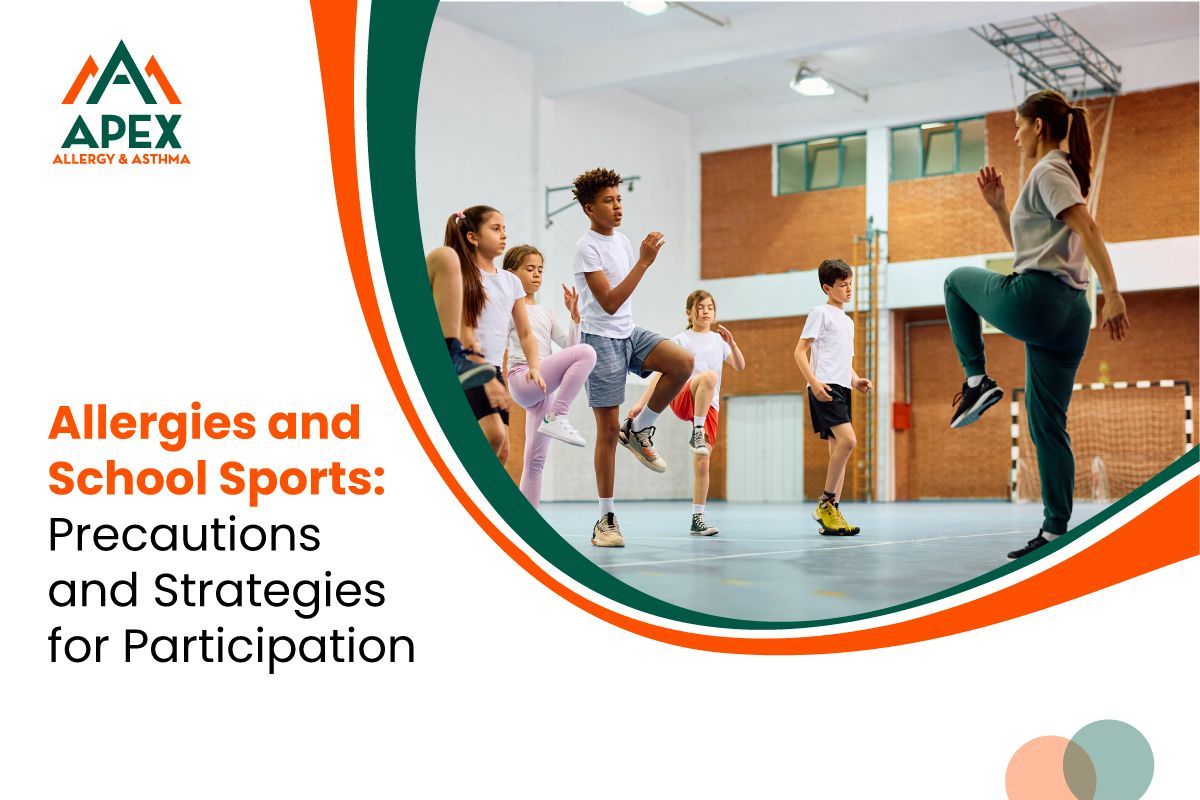According to the Centers for Disease Control and Prevention (CDC), the issue of food allergies is rapidly growing in the food safety and public health domain. This concern affects an estimated 8% of children in the United States, translating to 1 in 13 or roughly 2 students per classroom.
If you’re a parent, this statistic could be concerning, especially if your child has allergies and actively participates in school sports. But don’t let these figures overwhelm you. We’re here to walk you through the various precautions and strategies that parents, schools, and coaches can implement to ensure your child enjoys safe and allergy-free sports activities. By the time we're through, you will learn all the essentials of allergy prevention in school sports, from bolstering children's allergy prevention measures to implementing specialized game plans for kids with allergies. We'll explore the multitude of ways these efforts make a remarkable difference in the lives of your little ones.
Common Allergies That Affect School Sports
Allergies in schools are a serious hurdle for students participating in sports. They
impact performance and even pose serious health risks. Let's break down some of the most common allergies that affect students in the field.
- Food Allergies:
Food allergies, mainly caused by nuts, dairy, and other allergens, lead to severe reactions like
anaphylaxis. An accidental exposure during team meals or snacks triggers this life-threatening reaction.
- Pollen Allergies: For athletes with
pollen allergies, outdoor practices, and games become challenging. Pollen exacerbates allergies, causing sneezing, runny noses, and even asthma attacks, affecting performance and overall well-being.
- Allergic Asthma: Students with
allergic asthma struggle with shortness of breath and wheezing, particularly during intense physical activities or exposure to asthma triggers, such as dust and pollen from grass. These symptoms hinder their ability to participate fully and give their best on the field.
- Insect Sting Allergies: Allergies to bee or
insect stings cause swelling and hives, making outdoor activities uncomfortable and sometimes dangerous for students.
Overcoming Allergy Challenges in School Sports
Facing these allergy challenges with the right solutions helps students excel in school sports and truly enjoy extracurricular activities. Here's how to tackle these obstacles:
1. Precautions and Preparedness
Carry prescribed medications like
epinephrine auto-injectors and antihistamines at all times. It’s also crucial to have an action plan in case of an allergic reaction, including knowing the symptoms and signs and how to administer medication.
2. Effective Communication
Openly
communicating allergies to coaches, teammates, and school staff ensures everyone is aware and able to take the necessary precautions. This includes discussing safe snacks and meals and avoiding allergens during team activities and events.
3. Strategic Sports Selection
One of the most effective allergy safety tips is opting for sports with lower allergy risks, such as swimming in indoor pools, which helps minimize exposure to allergens like pollen. Since
outdoor locations tend to have more allergens, it's vital to consider the proper venue while planning a game.
4. Modified Schedules
Adjust training and competition schedules to avoid peak pollen seasons or high-allergen times of the day. Checking local pollen counts and keeping track of air quality reports help inform these decisions.
5. Healthy Lifestyle Choices
Maintaining a
healthy lifestyle with balanced nutrition, hydration, and regular exercise helps build resilience against allergy triggers. This includes avoiding known allergens in food and drinks, managing stress levels, and getting enough sleep.
6. Alternative Options
If certain sports pose too much risk, consider exploring alternative activities that align with your child’s health needs and interests. This could include non-competitive physical activities or other hobbies that promote physical and mental well-being.
School sports are safe for children with allergies if you take precautions and have strategies in place. By managing their allergies effectively, children can enjoy all the benefits of being part of a team, including improved physical fitness, increased self-confidence, and enhanced social skills.
The School's Role in Allergy Support
Schools ensure the safety of their students with allergies in several ways, such as the following:
A. Allergy Awareness
Educate staff, coaches, and students about allergies and their potential impact on sports participation.
B. Emergency Plans
Establish clear emergency action plans to handle allergic reactions swiftly and effectively. Let your child wear
medical identification jewelry to assist others in understanding that they have a severe food allergy in the event of an emergency.
C. Staff Training
Train school personnel to administer medications like epinephrine and respond to allergic emergencies.
D. Accommodations
Ensure accommodations are in place for students with allergies, such as modified meal options or safe spaces for medication storage.
E. Promote Inclusivity
Foster a culture of understanding and inclusivity where students with allergies feel supported and empowered to participate.
The involvement of schools empowers children with allergies to participate fully in school sports without the fear of severe allergic reactions. As parents and institutions collaborate on this initiative, the impact of food allergies recedes, and children will be able to enjoy athletic experiences as they would if they didn’t have allergies.
Frequently Asked Questions (FAQ) About Allergies and School Sports
What are the best allergy treatments for athletes?
Answer: According to the
Asthma and Allergy Foundation of America, proper allergy treatment depends on medical history, the findings of the allergy testing, and whether the symptoms are light or severe. So, the best allergy medicine for athletes is an allergy treatment plan that involves avoiding allergens, taking medications, and/or getting immunotherapy (shots or drops/tablets under the tongue).
What do parents need to know about allergies?
Answer: If your child has an allergy, you should know that it
happens when their immune system responds to an allergen, a foreign substance – whether it's something they eat, breathe, touch, or put in their body. An allergic response leads to hives, coughing, sneezing, rashes, itchy eyes, a scratchy throat, and a runny nose. Knowing these reactions will help you respond accordingly when your child has an allergy.
Overcoming Allergy Hurdles in School Sports With the Help of Experts
Managing allergies on the sports field may be a serious challenge, but they are not unbeatable opponents. Through precautions, intelligent decisions, and a network of support from schools and teammates, students will emerge victorious in sports unhindered by allergies. Remember, these challenges don't define your child's sports journey – they're just hurdles to overcome on the path to triumph.
Do you want to give your child the tools they need to succeed in school sports while learning to manage allergies effectively? Turn to Apex Allergy and Asthma. You will find us if you search for "allergies prevention in San Antonio, Texas." Our team of top medical professionals, led by double board-certified allergist
Mark Stahl, DO, is here to provide personalized guidance and support. Let's create a game plan that ensures your child's safety, good health, and success on the sports field.
Click "Schedule Today" on our homepage or dial (210) 490-2051 to schedule an appointment.






